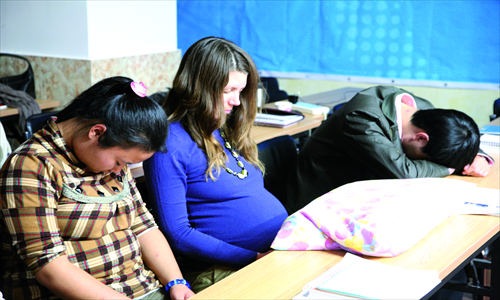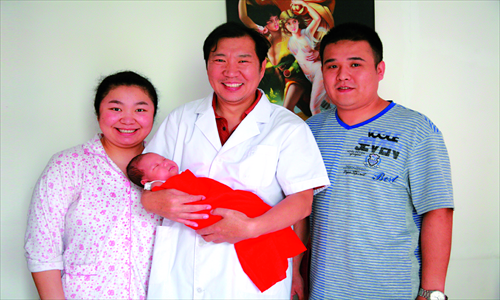Mind over matter


TV dramas have done nothing to ease women's fear of childbirth.
Now people don't just hear tales passed down by mothers of the difficulties of labor; they often see graphic scenes of women contorted in pain and making ear-piercing screams.
It is no wonder then that women are opting for a C-section in order to control and hopefully lessen the pain of childbirth.
According to Xie Ruobo, a maternal and child health expert at the World Health Organization, statistics show that C-section rates in China have reached almost 46 percent, making China the country that gets the most C-sections in the world.
However, some people claim that hypnotherapy is a pain-free alternative to drugs and knives. Lifestyle decided to investigate.
In theory
The term hypnosis delivery might sound new, but in fact it has been practiced as early as 1942. In a book called Childbirth Without Fear, written by English obstetrician Grantly Dick-Read, the idea that hypnosis can be used in delivery was introduced.
Today hypnotherapy for childbirth is offered at many National Health Service (NHS) hospitals in the UK, and is gaining popularity throughout the world.
This includes China. In Beijing, women can now try out the technique at the Antai Maternity Hospital in Fengtai district.
Chen Fenglin, director and owner of the private hospital, told Lifestyle that he believes natural activities of the human body should be pain-free since human beings have evolved in a way that means they tackle these issues.
These words are echoed in Antai Maternity Hospital's motto, which promotes natural birth.
"We introduced water birth several years ago and now we are combining water birth and hypnosis delivery to let women suffer less," Chen said.
"Delivery pain is caused by three factors: contraction of the womb, expansion of the vagina and fear and anxiety of delivery," Chen explained. "The last factor is the most important and can double the pain during labor."
Hypnosis delivery relieves the fear for women by shifting their concentration onto other things.
By achieving this, doctors in Antai Maternity Hospital adopt a certain protocol.
"First we let the woman lie in a warm water basin in a dark room with soothing music playing," Chen explained.
"Then we tell her to relax, instructing her to concentrate on one body part then another until her whole body relaxes. When her body floats it means she is hypnotized and ready."
The team draw on certain motifs that they know makes most people feel relaxed. For example, they tell them to imagine that they are lying on a beach or wading through the calm sea.
"The method many hospitals adopted before demanded the woman to push and push hard, which makes the delivery miserable and difficult. The more relaxed the woman is, the easier the birth is," Chen noted.
However, not every pregnant woman is suitable for hypnosis and many are advised to take a training course before they go into labor.
In the course, doctors go through a similar process to what will happen during labor, so women know what to expect.
"Each class is 45 minutes long and after attending three to five classes, they should be ready to go," Chen said.
In practice
Wang Yali, a 23-year-old woman from Hainan Province, experienced a hypnosis delivery in April with the help of Chen. Wang is a mother of two. Her second baby came out much easier compared to her first child four years ago.
Due to the hypnosis, Wang can't remember much about what Chen said to her during her delivery process. One thing that is clear in her mind though - this method really took the pain away.
"I had my first boy in 2009 and it was a terrible experience," Wang said. "It was so hard and I thought it would be nice for women to have babies without suffering the pain."
Four years later when Wang was due to have her second child, she happened to meet Chen in a maternity hospital.
"Chen and other experts introduced me to the idea of a water birth and hypnosis delivery. I wanted to experience it, since according to them, the process could be relaxing, pain-free and quite enjoyable," Wang recalled.
"When I lay in the water basin I felt like I was in a hot spring, but I was very nervous because it was my first time experiencing a water birth and hypnosis delivery."
Wang continued, "But Chen made me calm down and let me imagine that I could have a baby without pain and slowly I fell asleep and all my labor pains disappeared."
Wang's second boy came out healthy and for the first time, giving birth to a baby for her was enjoyable.
"I found that after I adopted this method, my recovery time was shortened," Wang said.
"Last time I lay in bed for almost four days before I could get up and walk, but this time I only stayed in bed for one night."
Other doctors were also interested in hypnosis.
Yu Shasha, director of the Department of Gynecology and Obstetrics in Beijing Shijitan Hospital, said that she had never heard of hypnosis delivery.
However, she was sure the method could help women lessen pain.
"Hypnosis delivery actually provides emotional comfort for women," Yu said. "Giving birth is hard. Having someone accompany you and say something that makes you relax is very good."
However, Yu expressed it is unlikely this service will be provided in public hospitals due to the logistics of it.
"We have limited staff and many women come here every day. The hypnosis delivery method involves many people, which is beyond our current means," Yu noted.